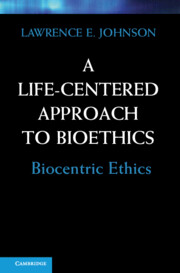Book contents
- Frontmatter
- Contents
- 1 Introduction
- Part I Backgrounds
- Part II Life, Death, and Bioethics
- 6 Being Alive
- 7 Being Healthy
- 8 Health and Virtue
- 9 Death and Life
- 10 Drawing Lines with Death
- 11 Double Effect
- 12 Concerning Abortion
- 13 The Gene, Part I
- 14 The Gene, Part II
- 15 Ethics and Biomedical Research
- 16 Bioethics Seen in an Eastern Light
- 17 Toward a Wider View
- Bibliography
- Index
13 - The Gene, Part I
The Mystique
Published online by Cambridge University Press: 05 June 2012
- Frontmatter
- Contents
- 1 Introduction
- Part I Backgrounds
- Part II Life, Death, and Bioethics
- 6 Being Alive
- 7 Being Healthy
- 8 Health and Virtue
- 9 Death and Life
- 10 Drawing Lines with Death
- 11 Double Effect
- 12 Concerning Abortion
- 13 The Gene, Part I
- 14 The Gene, Part II
- 15 Ethics and Biomedical Research
- 16 Bioethics Seen in an Eastern Light
- 17 Toward a Wider View
- Bibliography
- Index
Summary
It is only to state the well known and the obvious to remark that mentions of DNA and genes are every bit as central to innumerable contemporary discussions of bioethical issues as DNA and genes are central to life itself. Gene, and DNA are terms that light up like neon in the modern consciousness. Like neon, they often produce a striking effect without producing much by way of actual illumination. In the minds of a great many people, there is a mixture of information and misinformation about genes and DNA. This has had, and continues to have, a severely distorting influence on many discussions of diverse issues, not least bioethical issues. Difficulties are often further compounded by murky ideas about evolution and natural selection. Matters get all the more confused when we go to consider matters of genetic engineering. Although no one could hope to offer a complete and definitive discussion of such matters, I try to identify and clarify some of the problematic elements in the widely shared assumptions that many of us have about genes and DNA. I point out that many beliefs widely and firmly held about genes are actually incorrect. My intention is that this will lead to a clearer view of some important bioethical issues.
As well as with bioethical issues, genes are connected with some other very contentious issues as well, ranging from the agricultural to the social and political. Some contentious issues, for instance, concern whether there are inherent differences (other than the obvious) between the sexes or between the races (if, indeed, there actually are races). If there are such differences, so what? Extremely contentious issues concern the possibility that genes might affect our behavior, and these issues become all the more explosive when such hypothetical differences are linked with race or gender. To what extent can, or ought, the effect of genes that influence our behavior be modified by our life conditions and experiences? Furthermore, if there are genetic predispositions toward (supposedly) problematic behavior x – violence, substance abuse, schizophrenia, homosexuality, or whatever – to what extent are people responsible for their own behavior? What are society's rights and responsibilities concerning people with such (supposedly) problematic genes? These various matters tie in with a multitude of diverse social and ethical issues, a great many of which have a bioethical dimension. Certainly this is so whenever there is any possibility of the way in which people are treated being altered for the worse because other people have knowledge of their genetic makeup. This ties in with questions about how we should treat embryos in response to supposedly problematic genetic factors. Should we provide prenatal therapy? Perform abortion? Make our genetic selection prior to conception? Take some other proactive course? Beyond these, there are further issues that arise when we as a society contemplate allowing (or requiring) any alteration in the genetic makeup of human beings, individually or as a species.
- Type
- Chapter
- Information
- A Life-Centered Approach to BioethicsBiocentric Ethics, pp. 263 - 278Publisher: Cambridge University PressPrint publication year: 2010



